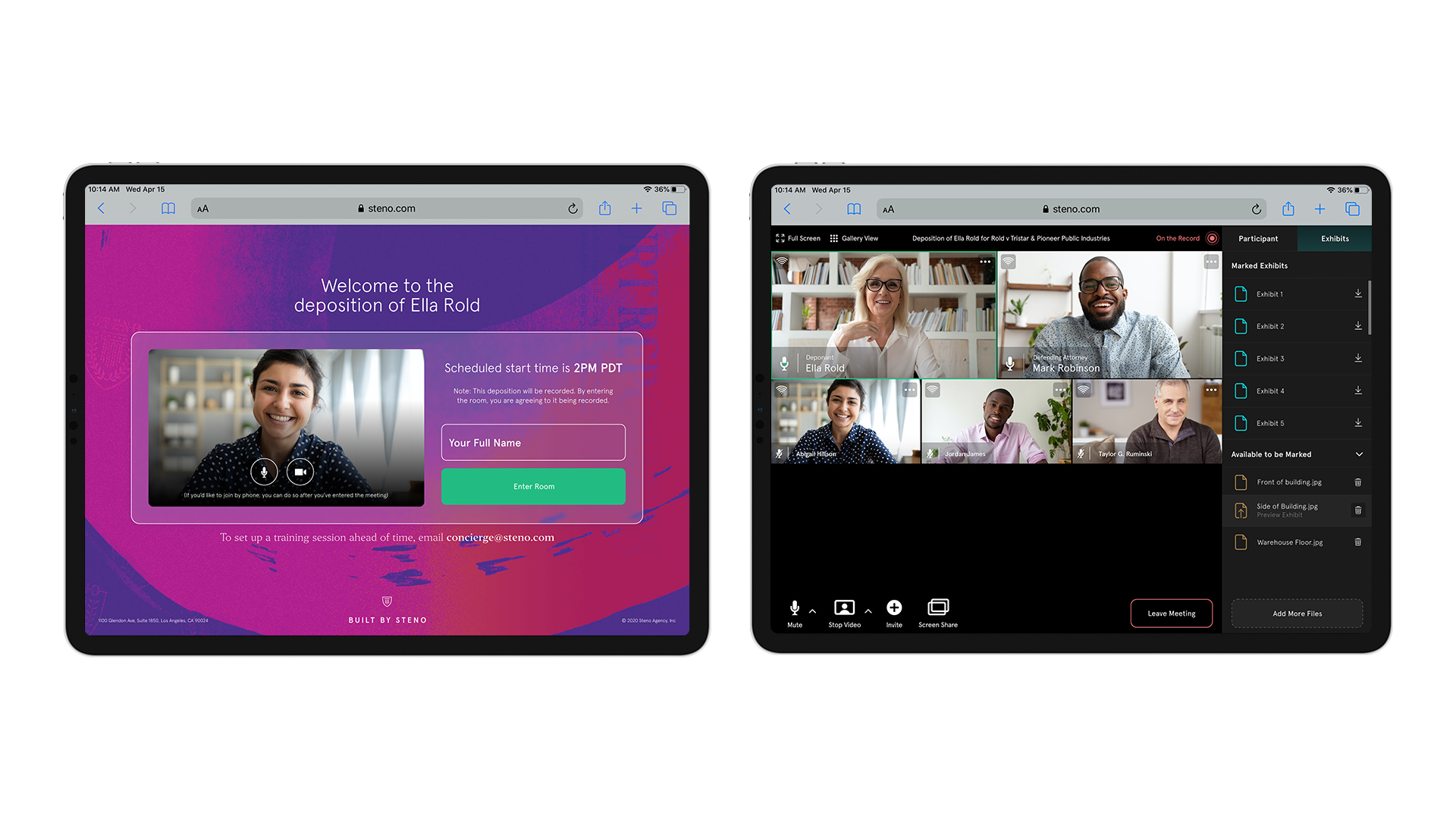Pair an accomplished civil litigator looking to rethink depositions with a successful technology entrepreneur who just sold his startup to a larger company, add in $3.5 million in seed funding, and you have a recipe for potentially disrupting how lawyers litigate big cases.
That is the formula underlying Steno, a court reporting agency that also offers non-recourse financing of deposition costs and its own video conferencing technology specifically built for remote depositions and exhibit handling.
It is a formula that could be particularly potent in this age of the pandemic, with depositions now routinely done remotely, often using generic business technology such as Zoom rather than something specifically built for litigation. It seems investors agree — the company recently raised $3.5 million on top of an earlier $1.5 million.
Los Angeles lawyer Dylan Ruga, a former Steptoe & Johnson partner who founded his own plaintiffs’ litigation firm in 2016, first conceived of Steno as a vehicle for financing deposition costs.
He was conducting so many depositions that the cost of court reporters was affecting his cash flow. But when he could find no court reporting agency willing to defer his payments on a non-recourse basis, he decided to start one.
Having never started a company, he took his idea to entrepreneur Greg Hong, who he knew from having represented his company in a trademark dispute. Hong had founded Reserve, a restaurant reservation system, and sold it in 2018 to another restaurant reservation company, Resy, which was later acquired by American Express.
After Ruga presented his idea to Hong, Hong began to explore the deposition process in more depth and saw the potential to do even more. “I realized there’s a much broader opportunity to improve the litigation process as a whole,” he told me during a recent conversation with the two founders.
With Hong as CEO, they started the company in 2018 as a court reporting agency that also provides a non-recourse payment option. They are a full-service court reporting and videography agency for both live and virtual depositions.
Their payment option, which they call DisbursePay, offers non-recourse deferred payments. Attorneys can hire all the court reporters and videographers they need, without worrying about upfront costs. If the case results in a recovery, the costs are paid then.
Remote Depositions Platform
The third prong of Steno, the remote deposition platform they call Depos from a Distance, was developed after the advent of the coronavirus crisis, when Steno was retained in a major, multi-party case that arose of California wildfires.
When they saw the need for a highly secure remote platform tailed to the unique needs of litigation, and finding nothing on the market that suited them, they decided to build their own.
The platform they developed is entirely web based, so no participant is required to download special software. While multiple individuals can participate in a deposition, the screen display is limited to five video feeds, to accommodate the two attorneys, the witness, the court reporter, and another.
Each participant can position the videos on their screen as they prefer and they will retain that position.
Exhibits are shown in a pane on the right side of the screen. The platform shows a scrolling list of all exhibits that have been introduced, and any one can be displayed while questioning the witness.
The company offers free training on the platform to all participants in a deposition.
The platform does not integrate with any third-party trial-presentation or management software.
Plans to Expand
Steno’s recent $3.5 million seed round was led by First Round Capital. It brings the company’s total funding to $5 million.
While the company has so far focused its deposition services on California and Nevada, it plans to use the funding to expand across the country and strengthen its presence in the overall market.
It will also focus on building out its platform and building other products aimed at improving the litigation process. One planned feature will enable easier scheduling of depositions through the platform.
While the pandemic has forced many attorneys into conducting depositions online, Ruga believes the technology is here to stay for the long run.
“Prior to COVID, I never wanted to take a remote deposition,” he said. “Now I see the benefits of remote depositions.”
One of those benefits, he said, is that you get a better recording of the witness than in a live deposition.
“In a conference room, the witness looks down at an exhibit and the camera doesn’t capture the reaction,” Ruga said. “In a remote deposition, the witness is looking at the screen with the webcam pointed right at their face.”
So as Steno offers court reporting services, payment financing, and remote deposition technology, is it a services company or a technology company?
“We’re all encompassing,” Hong said. “We’re not just a software provider, we’re not just a court reporting agency, we’re not just a finance company. We’re all in one.”
 Robert Ambrogi Blog
Robert Ambrogi Blog